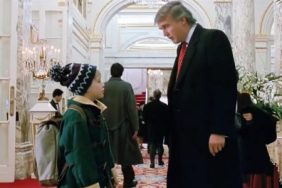
So, you got to be in this but I understand you came into this kind of last minute, right? How long have you actually been on this?
Yeah, it was an unusual process and I believe even a precedent for Chris Meledandri, the producer. He’d never seen anything like it, either. Typically, in the animated world, when you’re chosen as an actor to be a part of the project you come into a studio, by yourself, and you get to interact with a director. You’re not really working with other actors. You lay down your interpretation of the character and you’ll take one line, let’s say, and you’ll do it 25 different ways, at the suggestion of the director mixed with your own ideas. And then they’ll go off, in the post-production process and they’ll cull their choices and then animate a character, based on what they chose of what you gave them. That’s how it typically goes. In this case, I came in after the film was already locked. As everyone knows, Al Pacino was initially given the role of El Macho, Eduardo Perez. The animated character I was meant to voice, was entirely based on what he gave them, vocally. To my mind, it was a brilliant performance.
Oh, so you actually got to hear it! That exists, somewhere in a completed form and it was good.
Yes. I’m one of his disciples. To me, Al can do no wrong and on some level, I wanted to make sure that if this decision was going to be made, that I had his blessing.
Okay. So, did you contact him? Did you ask him?
No, but through our representatives, I wanted to make sure that he was copacetic, because it was a mutual decision between himself and the studio to part ways, over what has been termed, “creative differences.” That’s as much as I got.
Okay. But you did see his performance, and then you did your performance, so could you infer…? Like, did they ask you to do something different?
Well, the initial question was, “Is it even physically possible to do?” Because it’s kind of a math problem, if you think about it.
Yeah, because you have to sync your lips. You have a much harder technical job to do.
The first concern is the logistical one. “Can you physically fit the words into the mouth that we’ve animated to someone else’s voice?” My instinct was, “Yes.” The bigger trick, however, is, “Can you do it and make it seem organic? Can you do it and make it seem like it originated from your voice?” That was a bigger conundrum for me and here’s why. My initial approach, after absorbing the fact that, “Oh, okay. I’m the guy that was meant to now replace Al’s voice,” was, “How do I succeed?” So my first approach was to replicate what he did, and try to duplicate Al Pacino. I failed. Miserably, quite honestly. We wasted two days. “Waste” is probably not the word because it led to another place.
Yeah, you needed to burn through something in order to become something else.
And it became very clear that no one can do Al Pacino but Al Pacino. So, on some level, I left that as sacred ground and I had to back away from that approach and use his, to my mind, brilliant performance as a kind of guideline to what I could do. So, I switched it up and harkened back to my theatrical training, and relatives that I know and that’s how I found the heart and soul of who the guy is.
Now, he is El Macho, who’s sort of a Luchador villain, which is nice. I find Western Cinema has this wonderful tradition of it, but it never makes its way into an American movie. Was that an appeal to you? Are you familiar with those movies, like Santo and Blue Demon?
I’m actually not familiar with that pop cultural part of Mexican culture at all. The thing that I was really turned on by, aside from the fact that it was just a great character, was the very Latin flavor of who the guy is in the dual personalities. On the one hand, you have this guy who’s clearly in the throes of middle age. You know, he’s seen better days, physically. He’s let himself go. And he doesn’t seem to care much, because he still retains a kind of swagger in everything he does. This zest for life. This larger than life persona that is expansive in every way. I imagine he sees himself like a lot of guys do. He still thinks of himself as suave and debonair and smooth and a lover of life and a lover in general, so that’s the way he comports himself. For me, that was the way in. As I enter my middle age, I still think of myself as my best, younger self.
You haven’t let yourself go, though. You know? You can get through the door, easily. You’re fine. It’s slightly different for El Macho.
[Laughs] But you know, physicality is only part of that particular equation. The mental state of a person informs their health or their outlook or self-perception as much as anything else. In this case, his is still very healthy and that’s what I could latch onto. In the face of this physical degradation, he still very much sees himself as a man brimming with life because he is. We determined that he owns a restaurant and he happily is the host. He’s vivacious and loves to dance. He’s a loving father.
That was actually refreshing, actually to see essentially a bad guy… You know, he’s bad but he’s not like, vile. You know? He’s not like, “I will kill EVERYONE in the world!” He’s more like, “No, I want to…” I guess he wanted to rule? I’m a little hazy on what his plan was. “And we will create a bunch of monsters, and it will be awesome!”
He wanted to rule the world. In a way, I see Eduardo, or El Macho in this case, and Gru as brothers in a parallel universe. If you think about it, they have more in common than not. They both fancy themselves world class villains, they both have had or do have a desire to rule the world and they’re both great dads! So, this mix, this combination of this diabolical nature and this need to kind of dominate the world, balanced with this real tenderness, this real heart is an interesting kind of creative idea.








